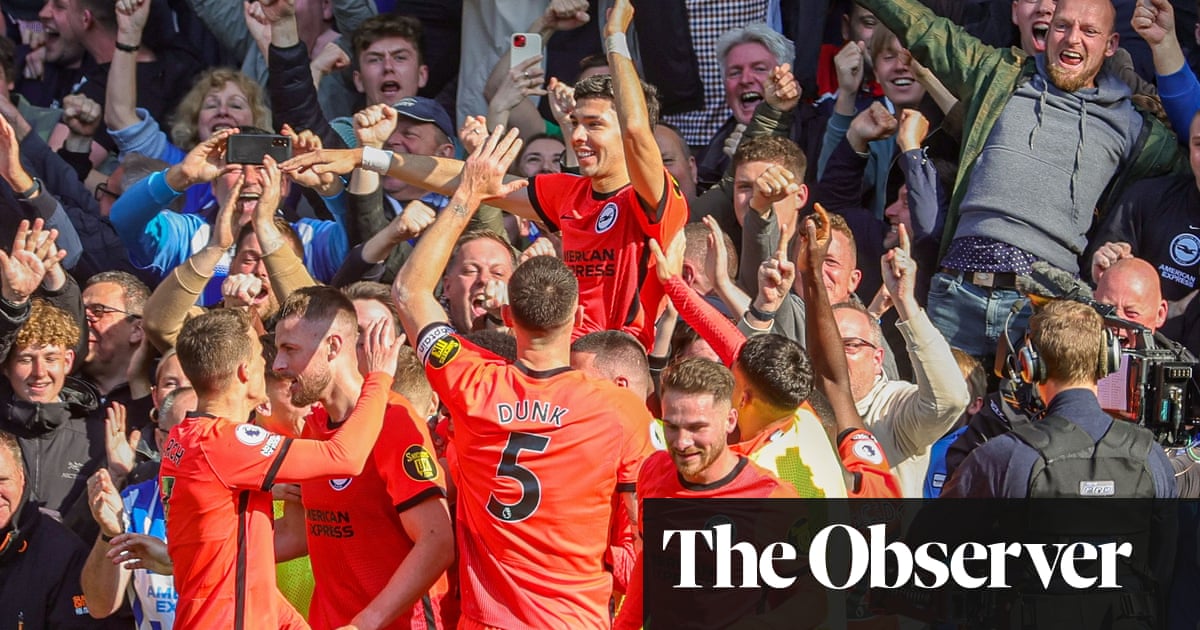
here is a concept in web design called infinite scroll, which you will be familiar with if you’ve ever used Twitter, Facebook or any other popular social media site. Essentially, it’s a piece of code that automatically adds new pages whenever you reach the bottom of the old one, allowing you to keep scrolling forever.
Football’s infinite scroll has been longer in the gestation, but its effects are largely similar. Last week it was announced that every Premier League fixture would be broadcast live until fans can return to stadiums: a move that will create a largely unbroken chain of televised football stretching from restart last June until at least May. On one level, this is a feast of football the likes of which we have never experienced in our lives. But to what end?
The problem isn’t so much the volume of football – as ever, you can watch whatever you want. Rather it’s the thinness and the ubiquity, football flattened out and reconstituted and smeared all over us like meat spread. The time we used to spend anticipating or reliving football is now simply filled with more football: auto-playing, mutating, manspreading. Already the flavours have become largely indistinguishable from each other: Barclays into Carabao into Gazprom, the usual rhythms and rituals of the week replaced with a sort of footballing insomnia. You can never truly sleep, but nor will you ever be entirely awake.
I love football and have spent the majority of my career writing about it. But it feels increasingly illegible: a disorienting, decontextualised stream of content played by various accomplished pressing teams in front of large plastic sheets, while commentators remind you about the game starting in an hour’s time and the latest team news from Villa Park. (There is always team news from Villa Park.)
It’s tempting to see all this as a pandemic-enforced nostrum, a temporary state of affairs. But that would be to ignore the longer-term trends in European football, for which the current content-overload is a dress rehearsal.
Europe’s top clubs are discussing significant changes to the Champions League, which would lead to the group stage being expanded from 32 to 36 teams, playing 10 games each. Three places could be reserved for clubs who failed to qualify but have done well in the past: essentially a safety net that would prevent Europe’s big clubs from ever dropping out of the competition.
This is an idea that in some form has been doing the rounds for several years now, which is why it seems so easy to ignore. Growing inequality, the greed of the richest clubs: yes, yes, terrible stuff. There comes a point when you simply get tired railing against things you can’t control. Yet this is what makes the current moment so dangerous: a sense that a dishevelled, distracted game is sleepwalking into seismic and irreversible change, that football’s bewildering flux disguises a terrifying precipice.
Let’s deal with the practicalities first: 100 extra games into a schedule already screaming at the joints and ligaments. “I think it could be possible to squeeze another four dates into the calendar,” said Lars-Christer Olsson, the chairman of the European Leagues, with all the insouciant magnanimity of a 16th-century pope.
Above all, though, it is this sense of an impregnable cartel slowly walling itself off and leaving the rest of us to gawp from a distance. There is an annoyingly prevalent view that the unpredictability of this season has been a sort of natural corrective to the established order. Paris Saint-Germain are third in Ligue 1. Juventus will almost certainly be dethroned in Serie A. The two Spanish giants are in varying states of disarray.
Look under the bonnet, however, and the post-Covid order is already shaking out. Manchester City, the only club in the country that can afford to have £250m of footballer sitting around – you know, just in case – are surging clear of an exhausted Premier League. Smaller clubs such as Tottenham, Southampton, Burnley and Brighton are loading themselves with debt in an attempt to compete. Championship clubs are being ordered to stop handing out goal bonuses and contract renewals to qualify for a Treasury bailout.
On the continent, the non-Qatar-owned part of Ligue 1 is running losses of more than £1bn. PSG have just signed one of the world’s best managers and either they or City will probably get Lionel Messi this summer. Bayern Munich have just kneecapped their biggest rivals again by signing Dayot Upamecano from RB Leipzig. Genuinely, how do we think all this is going to end?
Maybe it doesn’t. That’s the point. Doubtless if these changes pass the biggest clubs will be back in a few years’ time asking for something else: more games, bigger squads, fewer rules, the copyright to the word football, who knows. Maybe it seems disproportionate to be fuming about the machinations of the European Club Association when most of us are wondering when we’ll see our families again. Maybe, like most seismic changes, this one will happen while we were all looking the other way: too glazed to care, too tired to protest.
As the football continues to fall around our ears like confusing digital rain, we peer ever closer into the void, trying to make out some semblance of a pattern: Leeds and Chelsea Tuesday, City and Real Wednesday; Europa League Thursday. But it makes even less sense and so we peer harder. But it blurs a little and so we keep scrolling.












